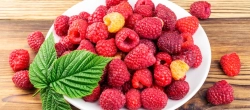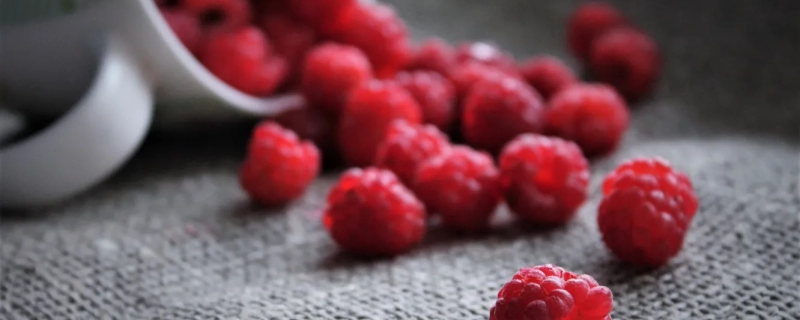Category: Fruits and Berries
Raspberry: Taste, Uses, and Benefits
Raspberries, a popular berry native to Europe and Northern Asia, are known for their vibrant red color, juicy texture, and sweet-tart flavor. These delicate berries are widely used in both sweet and savory dishes, adding a burst of flavor and color to desserts, sauces, and salads. With their high antioxidant content and versatility, raspberries are a favorite ingredient in various cuisines.
What does Raspberry taste like?
Primary Flavor Characteristics
Raspberries have a bright, sweet-tart flavor with a hint of floral and earthy undertones. The balance of natural sweetness and tanginess makes them refreshing and versatile, enhancing both sweet treats and savory dishes. The level of tartness can vary depending on the ripeness, with fully ripe raspberries being sweeter.
Aromatic and Taste Nuances
The aroma of raspberries is fruity and floral, often described as delicate and slightly perfumed. The taste combines a refreshing acidity with a juicy, sweet flavor that leaves a clean, slightly herbal aftertaste.
Scientific Description of Taste and Aroma
- Aroma: Fruity, floral, and mildly perfumed.
- Taste: Sweet-tart with floral and earthy notes.
- Texture: Juicy, tender, and slightly seedy.

In-Depth Flavor Analysis of Raspberry
Underlying Flavor Notes
Raspberries have a layered flavor profile that includes:
- Sweetness: The natural sugars give raspberries a bright sweetness, especially when fully ripe.
- Tangy Acidity: The tartness adds freshness, balancing the sweetness and making them refreshing.
- Floral Undertones: A mild floral aroma enhances the fruit’s delicate, refreshing character.
- Earthy Hints: A faint earthy quality adds depth to raspberries, particularly in wild varieties.
Impact of Ripeness on Flavor
- Unripe Raspberry: Firm texture with more pronounced tartness and less sweetness.
- Ripe Raspberry: Soft, juicy, with a balanced sweet-tart flavor and enhanced floral notes.
- Overripe Raspberry: Very soft and intensely sweet, often used in jams or sauces.
Textural Qualities
Raspberries have a tender, juicy texture with tiny edible seeds that add a slight crunch. Their delicate structure makes them melt in the mouth, adding a refreshing quality to dishes.
Culinary Uses of Raspberry
Primary Uses
- Fresh Eating: Raspberries are enjoyed fresh, either on their own or added to fruit salads for a sweet-tart flavor.
- Desserts and Baking: Raspberries are used in tarts, pies, cakes, and pastries for their natural sweetness and vibrant color.
- Jams and Preserves: The high pectin content in raspberries makes them ideal for homemade jams and preserves.
- Smoothies and Beverages: Raspberries add a fruity, refreshing note to smoothies, juices, and cocktails.
- Savory Sauces: Raspberries are used in sauces for meats or salads, where their acidity balances rich flavors.
Ideal Pairings for Raspberry
- Chocolate: Dark or milk chocolate complements raspberries’ tart sweetness in desserts.
- Citrus Fruits: Lemon and orange enhance raspberry’s natural acidity and brightness.
- Herbs: Mint and basil add freshness, balancing raspberries’ sweetness in salads and beverages.
- Vanilla: The creaminess of vanilla rounds out raspberries’ tartness, creating a smooth contrast in desserts.
- Cheese: Soft cheeses like brie or goat cheese pair well with raspberries in salads or appetizers.
Health Benefits of Raspberry
Key Nutrients and Benefits
- High in Antioxidants: Raspberries are rich in antioxidants, including vitamin C and anthocyanins, which help protect cells from damage.
- Dietary Fiber: The fiber content in raspberries supports digestion, heart health, and blood sugar control.
- Low Calorie Content: Raspberries are low in calories, making them a weight-friendly snack with high nutritional value.
- Vitamins and Minerals: Raspberries provide essential vitamins like vitamin C and K, as well as minerals like manganese and magnesium.
- Anti-inflammatory Properties: The antioxidants in raspberries may help reduce inflammation and support immune health.
Potential Precautions
- Seed Sensitivity: Some people may find the small seeds in raspberries difficult to digest.
- Natural Sugars: Raspberries contain natural sugars, so moderate consumption is advised for those monitoring blood sugar.

Tips for Choosing and Storing Raspberry
How to Choose Quality Raspberries
- Color and Firmness: Look for firm, bright red raspberries without signs of softness or mold.
- Aroma: Fresh raspberries have a fruity aroma; avoid berries with an overly soft or mushy texture.
Storage Recommendations
- Refrigeration: Store raspberries in the refrigerator and consume within a few days for optimal freshness.
- Freezing: Raspberries can be frozen for longer storage, making them suitable for smoothies or baking.
Fun Facts About Raspberry
- Ancient Origin: Raspberries have been cultivated since ancient times, valued for their medicinal and culinary uses.
- Multiple Varieties: Raspberries come in various colors, including red, black, and yellow, each with unique flavors.
- Rich in Anthocyanins: The red pigment in raspberries is due to anthocyanins, powerful antioxidants that give the berries their vibrant color.
Resources
Books and Publications for Further Reading:
-
"The Berry Grower: Inspiring Passionate Farmers" by Blake Cothron
– A comprehensive guide to cultivating and using berries, including raspberries. -
"On Food and Cooking: The Science and Lore of the Kitchen" by Harold McGee
– Explores the chemistry and culinary uses of berries in various dishes. -
"The Fruit Gardener's Bible" by Lewis Hill and Leonard Perry
– Offers practical advice on growing and harvesting raspberries and other fruits. -
"Wild Berries of the West" by Betty B. Derig and Margaret C. Fuller
– Features historical and culinary insights into wild and cultivated raspberries.